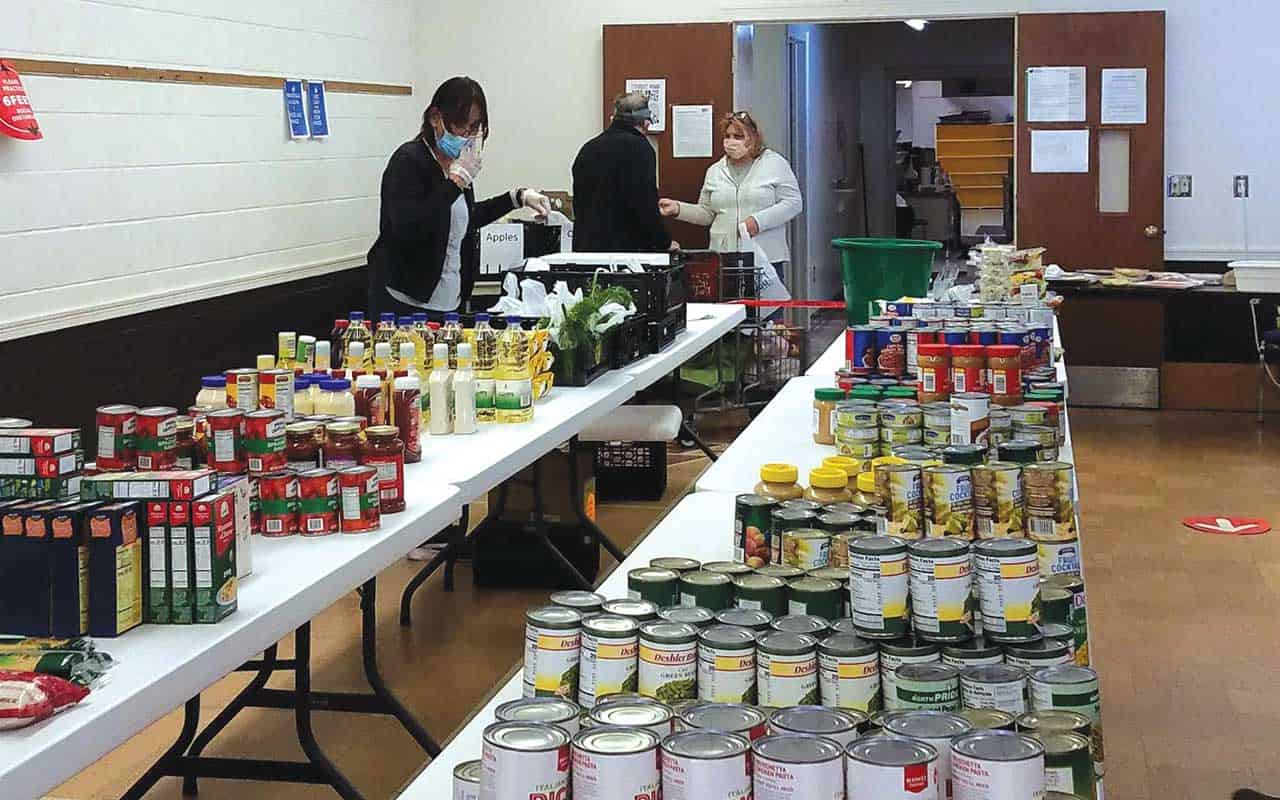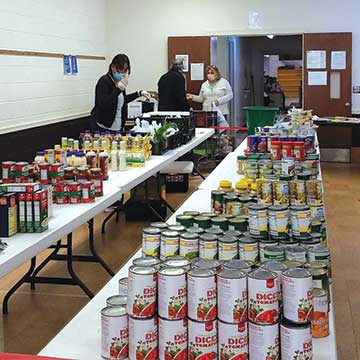This Month’s Featured Article

The Spirit of Giving
 In a year marred with tragedy, mountains of anxiety and a landslide of mass confusion, perhaps the most enduring notion of 2020 has been humankind’s uncanny ability to combat chaos with compassion. As fear and uncertainty grew at an historic rate this year and loved ones as dependent as they were isolated, communities across the area rallied like never before to give what little they had to feed those in need. Local food pantries became the crux of this communal effort and this year, despite the odds, pantries everywhere functioned as the arms that reached out to the hungry directly. With the help of local food banks and a little creative thinking, compassion stemmed the tide of uncertainty and the true meaning of the word community once again connected neighbors in a year that has seemed to be unimaginable.
In a year marred with tragedy, mountains of anxiety and a landslide of mass confusion, perhaps the most enduring notion of 2020 has been humankind’s uncanny ability to combat chaos with compassion. As fear and uncertainty grew at an historic rate this year and loved ones as dependent as they were isolated, communities across the area rallied like never before to give what little they had to feed those in need. Local food pantries became the crux of this communal effort and this year, despite the odds, pantries everywhere functioned as the arms that reached out to the hungry directly. With the help of local food banks and a little creative thinking, compassion stemmed the tide of uncertainty and the true meaning of the word community once again connected neighbors in a year that has seemed to be unimaginable.
As the calendar turns to December, and the traditions that connect us all this time of year begin, so too does the number of people who depend on selfless support. Here are the stories of a few of those organizations who fought through the past year despite massive challenges to feed others and what lies ahead for them in the coming months.
The Red Hook United Methodist Church Food Pantry
The Red Hook United Methodist Church (UMC) Food Pantry joined the Regional Food Bank of Northeastern New York in 2008. Former pantry leader Pat Brammer spearheaded the initial grant process that led to the purchase of two large chest freezers, two refrigerators, and was instrumental in forming the pantry itself. After Ms. Brammer passed away in 2019, members rallied to implement a food distribution system from the Red Hook UMC and even delivered all the way down to New York City.
“Before the COVID-19 outbreak, we operated entirely indoors,” says pantry member Janice Williams. “We operated primarily as what you would call a Client Choice Pantry. Our target population was anyone in need within the Red Hook School District and we averaged around thirty families each week.” However, by mid-March, as with nearly every business in the area, the process changed entirely.
The Red Hook UMC pantry transitioned to pre-packed food choices and began distributing outside the church’s building. Despite the mind-numbing logistics, the pantry’s dedication to feeding others led them to their formal registration process, and to this day will serve any and all who come. “We still continue to distribute non-perishables, as well as frozen meats, eggs, cheese, butter, bread, and whatever produce is available,” Janice says. “The combination of distributing food pre-packed and an increased number of clients, has created a large increase in our food requirements. We submit statistics monthly on the number of families, adults, children, and seniors who visit the Regional Food Bank. During October of this year we had an average of fifty families per week.”
Like many businesses who were forced to endure the shock of a new reality, the Red Hook UMC relied on the surrounding community for support. “The community support since March 2020 has been tremendous,” says Janice. “We have received additional grants at the Regional Food Bank, direct grants from Dutchess Responds, milk and egg vouchers from Stewart’s Shops, and a huge outpouring from local foundations and individuals.” According to Janice, the distribution process is continuing to evolve and there is a small core group of people that keep the pantry running and able to continually adapt. “We want to be a resource to anyone in need in the community,” says Janice. “Increasing our food variety and expanding our supply of personal care goods is essential. We continue to look forward to working cooperatively with community organizations assisting anyone in need.”
The North East Community Center
The North East Community Center (NECC) in Millerton, NY, has coordinated a Fresh Food Pantry program for many years that supplies local produce, eggs, and milk to other area pantries in Pine Plains, Amenia, and Dover Plains. “2020 is the first time the NECC has had its own more complete emergency food distribution program,” says NECC Food program director Jordan Schmidt. “The program started this past April and has been distributing food weekly by pickup and delivery since then. The intention was originally to serve seniors and other clients who were homebound or unable to travel for groceries. When the pandemic hit NECC pivoted to meet a growing local need for food assistance. We are currently serving about forty households each month with clients ranging from babies to seniors.”
In March, when food needs were extraordinarily amplified by the pandemic, the NECC was forced to quickly expand from their traditional food distribution plan. “Providing delivery has meant that we can offer contactless groceries to households with elevated risk and to low income residents in quarantine,” Jordan says. “As the pandemic progresses, we have realized that there is a significant need for delivery-based emergency food service in a region in which transportation can be challenging.”
Typically, during the Holiday season, the NECC’s teen program supports holiday food baskets offered by the Millerton Presbyterian Church by baking pumpkin pies and providing produce from local farms for the baskets. This year, because the teens are unable to bake due to safety precautions, they are instead putting together pumpkin pie “kits” complete with ingredients and hand-made recipe cards. In a show of endearing seasonal spirit, the NECC food and supply pantry is coordinating with other local pantries to make sure folks receive food for a holiday meal.
“The community has been incredibly generous in helping us to launch and expand our programs,” says Jordan. “Throughout the spring and summer we functioned almost exclusively on donated funds, food, and volunteer hours. While the pandemic has meant extreme challenges from a food security perspective, it has also illuminated the dedicated and collaborative group of people and organizations working on food access in this region. It has been a community tour de force”
Fishes & Loaves Food Pantry
In 1992, Canaan, CT’s Fishes & Loaves Food Pantry began as a one-room pantry for non-perishable food at Pilgrim House in North Canaan, CT, as a mission of the North Canaan Congregational Church. Nearly thirty years later, the pantry has become a small-town staple and has since expanded to include meat, produce, and dairy, and gradually acquiring eight freezers and four refrigerators to preserve items. Throughout the decades, visiting families slowly grew to an average of eighty households visiting weekly.
Since the onset of COVID-19, that figure has increased to over one hundred families seeking assistance in meeting their nutritional needs, due to the small wave of economic crisis. “COVID-19 caused a change in protocol,” says member Louise Riley. “Patrons were once able to pick out their own food by shopping our shelves; since March of this year, however, we have closed Pilgrim House to the public and volunteers pack boxes for curbside pick-up.”
Though Louise doesn’t see procedures reverting to self-selection in the near future, her and the other volunteers at Fishes & Loaves are grateful for the immediate supportive response from the community including the local Stop & Shop where they pick up meat, bread, and pastries as well as the many local faith-based organizations and senior living homes that have contributed food and funds. “This Holiday season is more challenging than usual because there is not as much availability of food from the Connecticut Food Bank,” Louise says. “For example, last year we were allocated 64 turkeys plus accompanying vegetables and stuffing. This year, we will only receive 28 turkeys and there is no guarantee that we will get vegetables. To stay strong, we have begun a drive for ‘Thanksgiving Fixins’’ on social media and by sharing with local organizations.”
The People’s Pantry GB
Aptly named, The People’s Pantry of Great Barrington, MA, was founded in 1999 as an all-volunteer organization. Thanks to the surrounding community, it has grown slowly and steadily and has moved from church basement to school cafeteria and finally a permanent home in Saint James Place, right in the center of Great Barrington. “From the beginning, we have served the people of the South Berkshire area without any income requirements,” says Beth Moser, vice president of the pantry’s board. “Our local community could hardly be more supportive.”
Like most organizations, almost everything about the pantry has had to change since March. “Simply put, people used to come indoors, now they don’t,” says Beth. “The pantry was previously staffed by teams of volunteers but most of those volunteers were seniors who could not risk exposure to the virus and we have had to hustle to create new teams of younger folks.”
Adaptation has bred evolutionary change and the pantry now includes a Spanish speaker in each team as the number of Spanish speaking families has increased. Naturally, the pantry has had to obtain much more food as well. “The two main players in making this happen are The Food Bank of Western Mass and Berkshire Bounty,” says Beth. “The Food Bank immediately increased the amount of food we could order. They also provided an extremely generous grant. Berkshire Bounty delivers food donated from local supermarkets and holds monthly food drives. Our local grocers – especially Guido’s Fresh Marketplace – and small farmers have stepped up in truly remarkable ways.”
As time marches on toward an uncertain future, pantries everywhere have found solace in the fortitude of the giving spirits that surround them each day. “The pantry has been embraced by our neighbors,” says Beth. “Our donation boxes are full most days and the level of financial support is tremendous. The entire experience has been deeply moving to those of us involved.”


